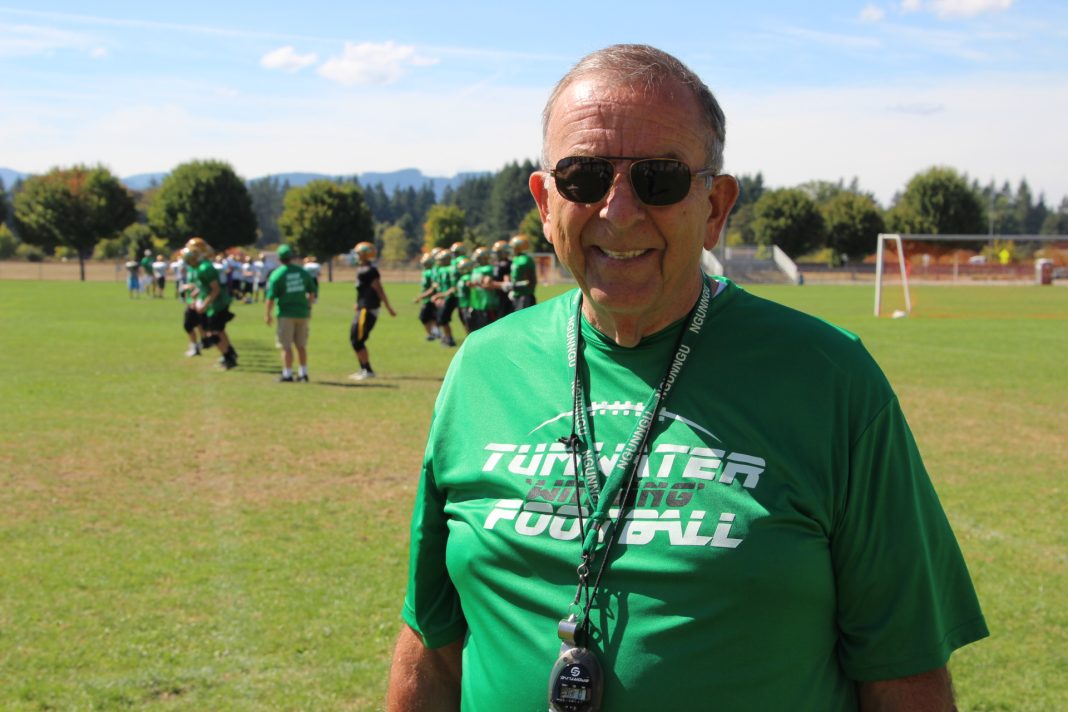As a kid growing up in Lewiston, Idaho, Sid Otton was more interested in fishing then playing football.
But one fall afternoon after a good day of fishing on the Snake River, Sid got an unexpected phone call that would change his life – and, ultimately change the lives of hundreds of young men.
 Bud Riley, then the football coach at Lewiston High School back in the 1960s, wanted to know why Sid wasn’t turning out for football.
Bud Riley, then the football coach at Lewiston High School back in the 1960s, wanted to know why Sid wasn’t turning out for football.
“I’m the youngest of four children,” Sid said. “Sports wasn’t emphasized. I just wanted to go fishing.”
That coach’s nudge got Sid, then a gangly 6-foot-4 junior, onto the football field. Begrudgingly, Sid turned out for football. A couple of years later, he was on a football scholarship at Weber State University, eventually earning all-conference honors on both offense and defense and becoming the school’s first All-American. And now 50-some years later, Sid, Tumwater High School’s coach since 1974, is the state’s all-time winningest football coach.
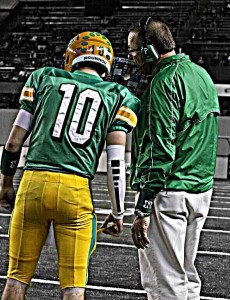
One phone call. One decision. What a life changer.
“I wouldn’t have coached,” Sid said. “I wouldn’t have met my wife, Marjean. Life would have been so different.”
Now, 42 years after Sid went to his first practice as the Tumwater coach, he’s in his goodbye season, his last as the Thunderbirds coach. Besides the wins – he’s the state’s winningest coach with a 384-129 career record – and the state championships – his T-Birds have won five state titles and reached the state championship game eight times, placing second three times – Sid’s legacy is his impact in shaping lives. That’s the achievement he treasures most.
“This is a payback,” Sid said about his commitment to coaching. “For me, that is what coaching is about – payback.”
Over the years, Sid has been like a compass, pointing young men in the right direction.
“I share my story about quitting football with players I’ve coached,” Sid said. “And with players who weren’t going to turn out.”
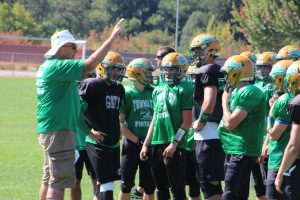
Sid had a don’t-quit talk with Mike Anderson in 1999, encouraging him to stay on the team. Anderson ended playing football at Whitworth, another talent saved from derailing.
“He shares his story. He reaches down,” said Anthony Hicks, an all-state running back for Sid in the 1990s and now coaches with him. “That’s what this program is about. He’ll talk with those fence sitters. He says ‘hey I know you’re enjoying your time, but would you like to be part of something bigger? A team.’”
As a player and now as a coach, Hicks has seen both sides of T-Bird football. And he’s excited to be part of it, helping kids.
“I hate to say saving lives, but it’s kids who are fence sitters,” said Hicks, who went on to play football at the University of Washington and then Pacific Lutheran University. “Football is just a vehicle. It’s the comradery that these kids can build, the lifelong dreams, the goals. That’s what’s cool.”
Many years ago, someone asked Sid how he figured his team, which had playoff potential, would do that season. And Steve Shoun, one of Sid’s assistant coaches since 1982, has never forgot Sid’s answer. “His response was, and it was probably a great team, ‘I’ll tell you in 20 years,’” Shoun said. “That’s the exact quote.”
Sid’s measuring stick has never been the wins and losses. It’s about the impact on shaping a young man’s life.
“The wins and losses are important and it comes along with that,” Shoun said. “But he’s always been emphasizing building boys into men. That’s how it works.”
As a freshman at Tumwater, Bill Beattie was a scrawny, 5-foot-7 quarterback who was small in stature and skill. But by the time Beattie was a senior, he was an all-league lineman in love with football. Now, Beattie is the longtime football coach at Olympia High School, patterning his team after his mentor and friend.
“I can honestly say, I wouldn’t be doing what I’m doing if it wasn’t for Sid,” Beattie said. “Sid didn’t make me feel I was this loser who didn’t belong out there. He made me feel like I belonged.”
The line of indebted players has grown over the years. Many, influenced by Sid, went into coaching themselves, following the footsteps of a coach who stressed team unity, goal setting and being willing to prepare to win. “Sid’s Kids” who went on to be coaches include Beattie, Hicks, Matt Hinkle, Randy Leeper, Dale Cole, and Jason Tobeck.
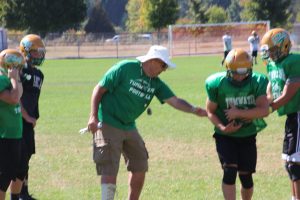
Hinkle, the long-time head coach at Shelton High School who played defensive end for Sid in the 1970s, feels indebted to Sid.
“He had such an impact on my life,” Hinkle said. “He’s a big reason why I went into coaching. You see what he did and how he shaped lives, and you think that’s something you’d like to do.”
Sid’s connection continues. At the end of a season, he mails a letter to Beattie and Hinkle and other coaches, congratulating them on a good season and passing along an inspiring word.
“He’s such a great communicator,” Hinkle said. “His letter will just pump you up. It’s just how he phrases things.”
When Hinkle’s father died, Sid went to the funeral and offered his condolences. It wasn’t an easy thing to do, but Sid went to encourage and to offer a hand of friendship.
“I just have such high regards for Sid Otton,” Hinkle said.
A testament to Sid’s loyalty and his get-along nature is the loyalty of his assistant coaches. Pat Alexander has been Sid’s defensive coordinator since 1976. Steve Shoun joined the team in 1982, Jamie Weeks in 1986 and Rob Hinkle in 1987. For coaches to stay that long is incredible.

“That’s what made it so special for my dad,” said Tim Otton, who like his dad went on to play football for Weber State. “This coaching staff is like family. We do a lot together.”
There’s been a special bond between Sid and Alexander.
“He’s the greatest role model,” Alexander said. “People have asked me if he walks on water. I haven’t seen it, but I wouldn’t bet against it. He’s a great role model.”
Over the years, there’s one thing Sid hasn’t liked about coaching – being in the spotlight. In 2006, Sid stood behind a microphone in a packed room at the American Football Coaches Foundation gathering in San Antonio, Texas, accepting a national award for coaching. It was the last place he wanted to be, but it was a deserving award.
He stood in front of an applauding crowd of 1,000 people, famous names that included Joe Paterno, Bobby Bowden, Jim Tressel, Peter Carroll and Tyrone Willingham. Sid’s award was the only high school award presented that night. He was only high school coach in the country honored, magnifying the moment.
Sid’s award, The Power of Influence Award, is presented to the country’s high school football coach who best exemplifies positive influence on his players. It was a deserving award.
It’s not that winning didn’t matter – his T-Birds have reached the state championship game four times in the past six seasons. But it was never the only goal for Sid.
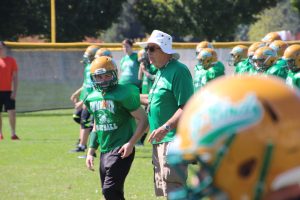
“He’s passionate about winning,” Alexander said. “But he’s also about shaping the lives of these young men.” It’s never just been about the scoreboard. “The objective is to take boys and build them into men who care more about other people then themselves.”
By placing team first, by emphasizing “family,” Otton never lost that knack for making the end-of-the-bench player feel significant. What he’s done over and over is create this feeling that you belong on the team.
Football and family in the Otton house always seemed to overlap. His two sons, Tim and Brad, both played for him. On Friday nights, Marjean Otton would cook steak dinners, a pre-game ritual. After games, coaches and their wives came over to the Otton house.
“I am very proud of him for who he is and all he has accomplished,” Marjean Otton said. “But I have to say, above all, his greatest accomplishments are that of being the best husband, father and grandfather. He is a tremendous example to us all.”
As Sid reflects, he has no regrets. “I’m 100 percent happy with the course of my life,” Sid said. “It’s been great.”
An entire community and about 2,400 boys who played T-Bird football for Sid over 42 years would stand to their feet, cheering and saying the same thing – “It’s been great.”









































